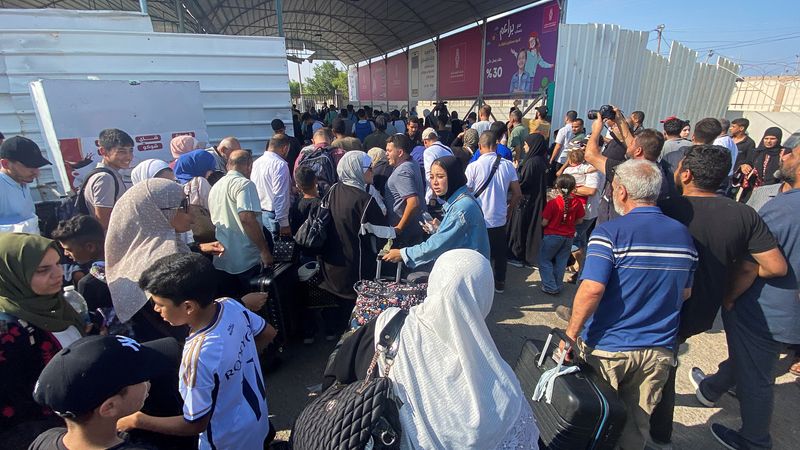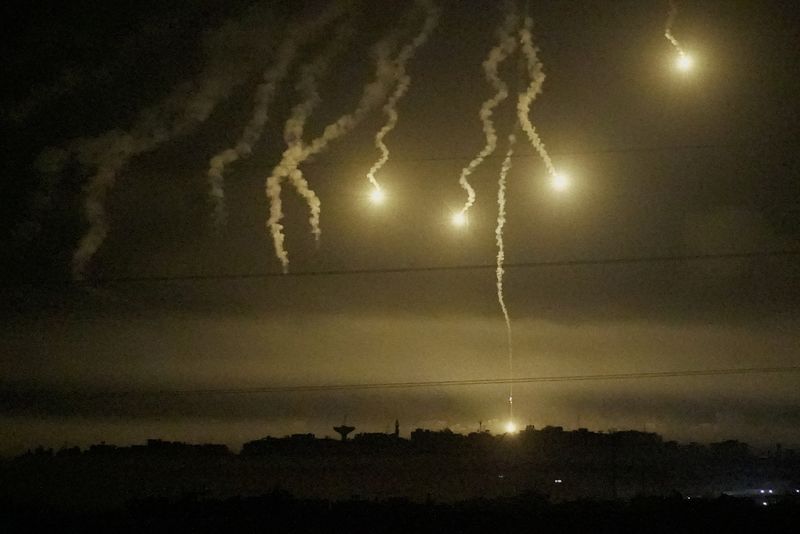By Nidal al-Mughrabi and Dan Williams
GAZA/JERUSALEM (Reuters) -Israeli forces killed another Hamas commander on Wednesday in their second strike on Gaza's Jabalia refugee camp in two days, the military said, as the first group of civilian evacuees from the besieged enclave crossed into Egypt.
Pressing an offensive against Hamas militants, Israel again bombed the densely populated Gaza Strip from land, sea and air in its campaign to wipe out the Islamist group after its deadly cross-border rampage into southern Israel on Oct. 7.
Palestinians sifted through rubble in a desperate hunt for trapped victims after Israel's strike on Jabalia, Gaza's largest refugee camp.
"It is a massacre," said one witness of the strike.
The Israeli military said its fighter jets struck a Hamas command and control complex in Jabalia "based on precise intelligence," killing the head of the Islamist group's anti-tank missile unit, Muhammad A'sar.
"Hamas deliberately builds its terror infrastructure under, around and within civilian buildings, intentionally endangering Gazan civilians," an Israeli statement said.
United Nations human rights officials said the operation could be a war crime.
"Given the high number of civilian casualties & the scale of destruction following Israeli air strikes on Jabalia refugee camp, we have serious concerns that these are disproportionate attacks that could amount to war crimes," the U.N. High Commissioner for Human Rights wrote on social media site X.
There were no immediate figures from Gaza authorities on casualties from the explosion at the camp on Wednesday. Palestinian health officials said the first Israeli airstrike on Tuesday killed about 50 people and wounded 150.
Israel said Tuesday's strike killed Ibrahim Biari, who it described as a ringleader of the Oct. 7 attack on Israel.
U.S. Secretary of State Antony Blinken will travel to Israel and Jordan on Friday, the State Department said. He will meet Israeli Prime Minister Benjamin Netanyahu for an update on Israel's military objectives, it said.
VISIONS OF DEATH
Dr. Fathi Abu al-Hassan, a U.S. passport holder waiting to cross into Egypt, described hellish conditions inside Gaza without water, food or shelter.
"We open our eyes on dead people and we close our eyes on dead people," he said while waiting to cross into Egypt.
"If this happened in any other country ... even in the desert, (people) will combine together to (help) us," he said.
People evacuated to Egypt, trapped in Gaza since war began on Oct. 7, included passport holders from Australia, Austria, Bulgaria, the Czech Republic, Finland, Indonesia, Italy, Japan, Jordan, the United Kingdom and the United States.
They were driven through the Rafah border crossing and underwent security checks, officials said.
On Wednesday, at least 320 foreign passport holders on an initial list of 500 as well as dozens of severely injured Gazans left, Egyptian sources and a Palestinian official said, under a deal between Egypt, Israel and Hamas.
At least 49 medical evacuees arrived in Egypt, the governor of Egypt's North Sinai province told reporters later.
Nahed Abu Taeema, director of Gaza's Nasser Hospital, told Reuters that the evacuees would include 19 critically injured patients from his hospital, including children, who require advanced surgeries.
Some 1,000 Palestinian children from Gaza were being offered treatment at hospitals in the UAE, accompanied by their families, the UAE state-run news agency WAM said.
Gaza border officials said the frontier would reopen on Thursday so more foreign passport holders could exit. A diplomatic source briefed on Egyptian plans said some 7,500 foreign passport holders would be evacuated from Gaza over about two weeks.
HAMAS CANNOT GOVERN GAZA IN FUTURE, WHITE HOUSE SAYS
Israel sent ground forces into Hamas-ruled Gaza late last week after weeks of air and artillery strikes to retaliate for the surprise Hamas attack in which Israel says 1,400 people, mostly civilians, were killed and 240 were taken hostage.
The Gaza health ministry says at least 8,796 Palestinians in the narrow coastal enclave, including 3,648 children, have been killed by Israeli strikes since Oct. 7.
The Israeli military said one soldier was killed in Gaza on Wednesday on top of 15 on Tuesday. Hamas rocket fire persisted with warning sirens in southern Israeli communities as well as the Mediterranean port cities of Ashkelon and Ashdod.
"We are in a tough war," Netanyahu said. "I promise to all citizens of Israel: We will get the job done. We will press ahead until victory."
White House national security spokesperson John Kirby said on Wednesday that Washington did not believe Hamas could be involved in governing Gaza when the war is over.
Despite the rising civilian death toll in Gaza, Kirby also said the U.S. did not believe now was the time for a general ceasefire, but humanitarian pauses in hostilities were necessary.
Hospitals struggled to cope as shortages of fuel forced shutdowns. Israel has refused to let humanitarian convoys bring fuel into the shattered enclave, citing concern that Hamas fighters would divert it for military purposes.
Medical student Ezzedine Lulu, working at Al Shifa hospital in Gaza, filmed himself walking through corridors filled with sleeping children sheltering from the bombardment.
"I can heal the wounds, I can stop the bleeding, I cannot heal the cold of these children's bodies. I see them shaking while they are sleeping, they have nothing to cover themselves with. Winter is coming ... Stop the inhumanity," he said.
The desperate humanitarian conditions have prompted concern globally as food, fuel, drinking water and medicine run short.
Jordan, one of a handful of Arab states to have normalised relations with Israel, said on Wednesday it was pulling out its ambassador from Tel Aviv until Israel ends its assault on Gaza. Israel said it regretted Jordan's decision.

Yemen's Houthi movement, which like Hamas is supported by Iran, said late on Wednesday it had launched a large batch of drones at several targets in Israel.
The group will "continue carrying out military operations in support of Palestinians, until the Israeli aggression in Gaza stops," Houthi military spokesman Yahya Sareahe said.
